BS4S16 - Leadership & Management Theories: Dangote Group Analysis
VerifiedAdded on 2023/04/20
|28
|7034
|103
Report
AI Summary
This report provides a critical evaluation of leadership and management theories, applying them to the organizational context of the Dangote Group, a prominent international conglomerate based in Nigeria. It begins by introducing various leadership theories, including the Great Man Theory, Trait Theory, Behavioral Theory, Contingency Theory, Transactional Theory, and Transformational Theories. The report then offers an overview of the Dangote Group, its history, structure, and recent expansion efforts, particularly focusing on Dangote Cement under the leadership of CEO Joseph Makoju. It analyzes the appropriateness of current leadership traits within the company, discusses the importance of participative leadership for business expansion, and proposes implementing participative leadership in Dangote Cement, outlining potential collaborations between employees and management. Finally, the report evaluates the probable outcomes of these strategies, concluding with a summary of the findings and recommendations.
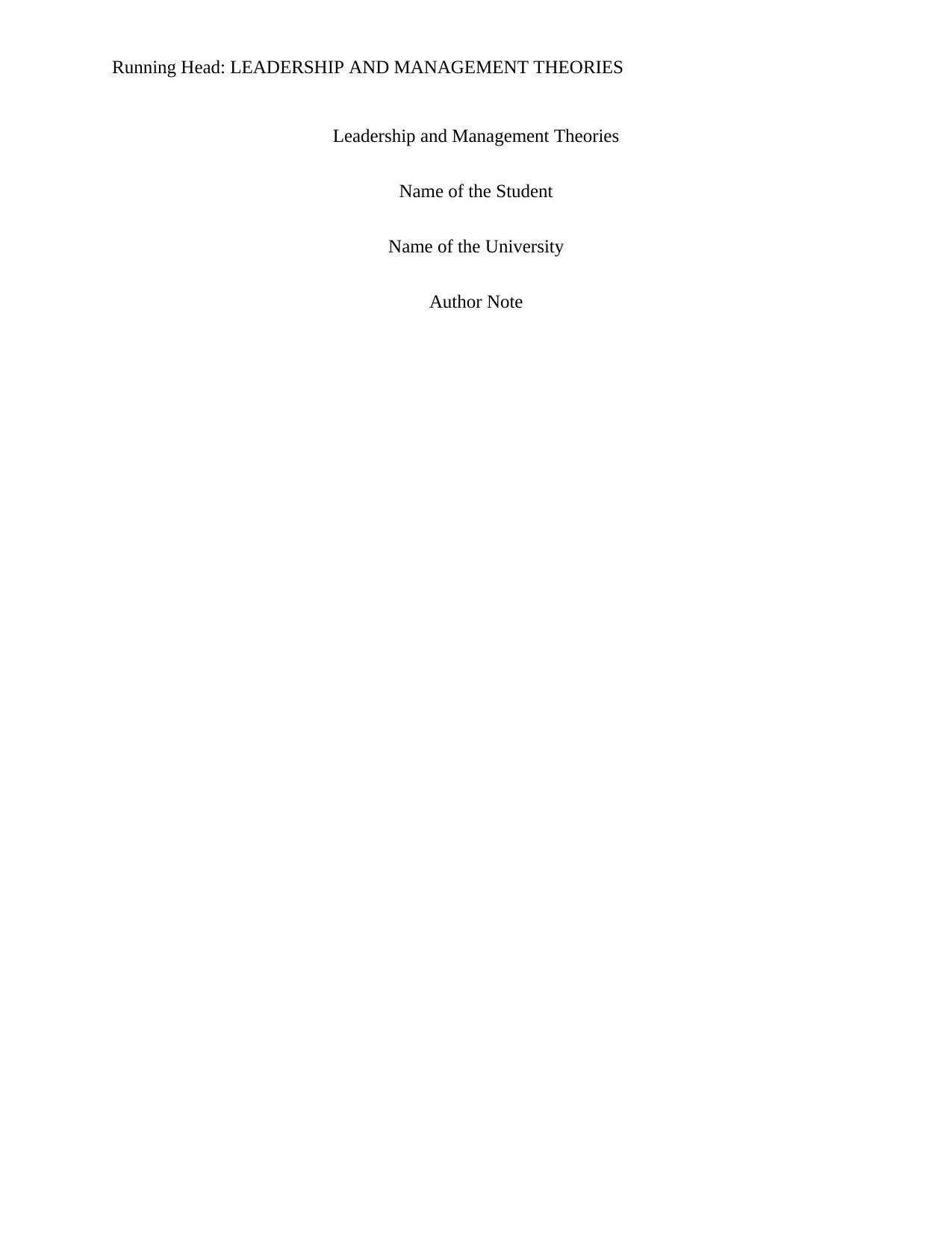
Running Head: LEADERSHIP AND MANAGEMENT THEORIES
Leadership and Management Theories
Name of the Student
Name of the University
Author Note
Leadership and Management Theories
Name of the Student
Name of the University
Author Note
Paraphrase This Document
Need a fresh take? Get an instant paraphrase of this document with our AI Paraphraser
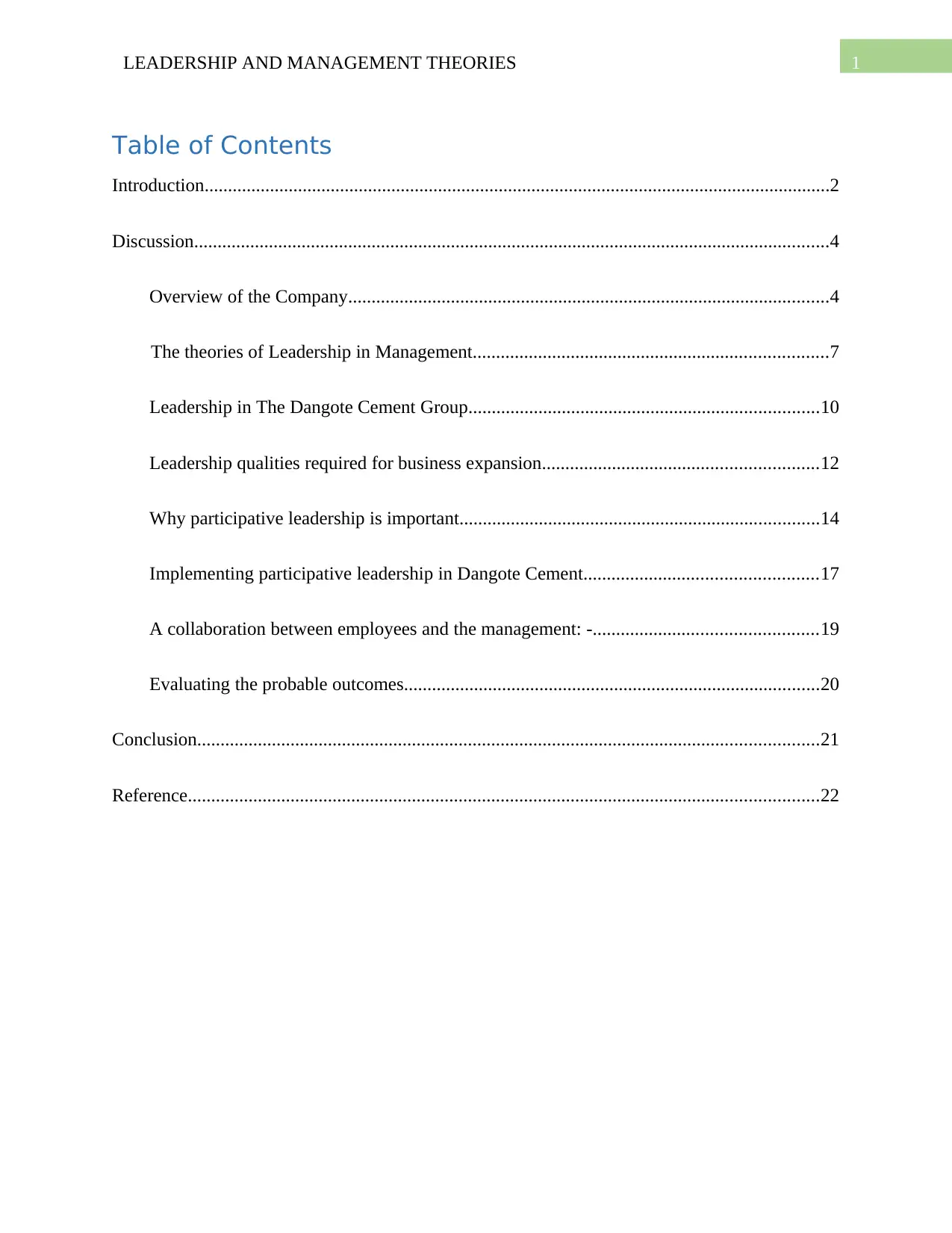
1LEADERSHIP AND MANAGEMENT THEORIES
Table of Contents
Introduction......................................................................................................................................2
Discussion........................................................................................................................................4
Overview of the Company.......................................................................................................4
The theories of Leadership in Management............................................................................7
Leadership in The Dangote Cement Group...........................................................................10
Leadership qualities required for business expansion...........................................................12
Why participative leadership is important.............................................................................14
Implementing participative leadership in Dangote Cement..................................................17
A collaboration between employees and the management: -................................................19
Evaluating the probable outcomes.........................................................................................20
Conclusion.....................................................................................................................................21
Reference.......................................................................................................................................22
Table of Contents
Introduction......................................................................................................................................2
Discussion........................................................................................................................................4
Overview of the Company.......................................................................................................4
The theories of Leadership in Management............................................................................7
Leadership in The Dangote Cement Group...........................................................................10
Leadership qualities required for business expansion...........................................................12
Why participative leadership is important.............................................................................14
Implementing participative leadership in Dangote Cement..................................................17
A collaboration between employees and the management: -................................................19
Evaluating the probable outcomes.........................................................................................20
Conclusion.....................................................................................................................................21
Reference.......................................................................................................................................22
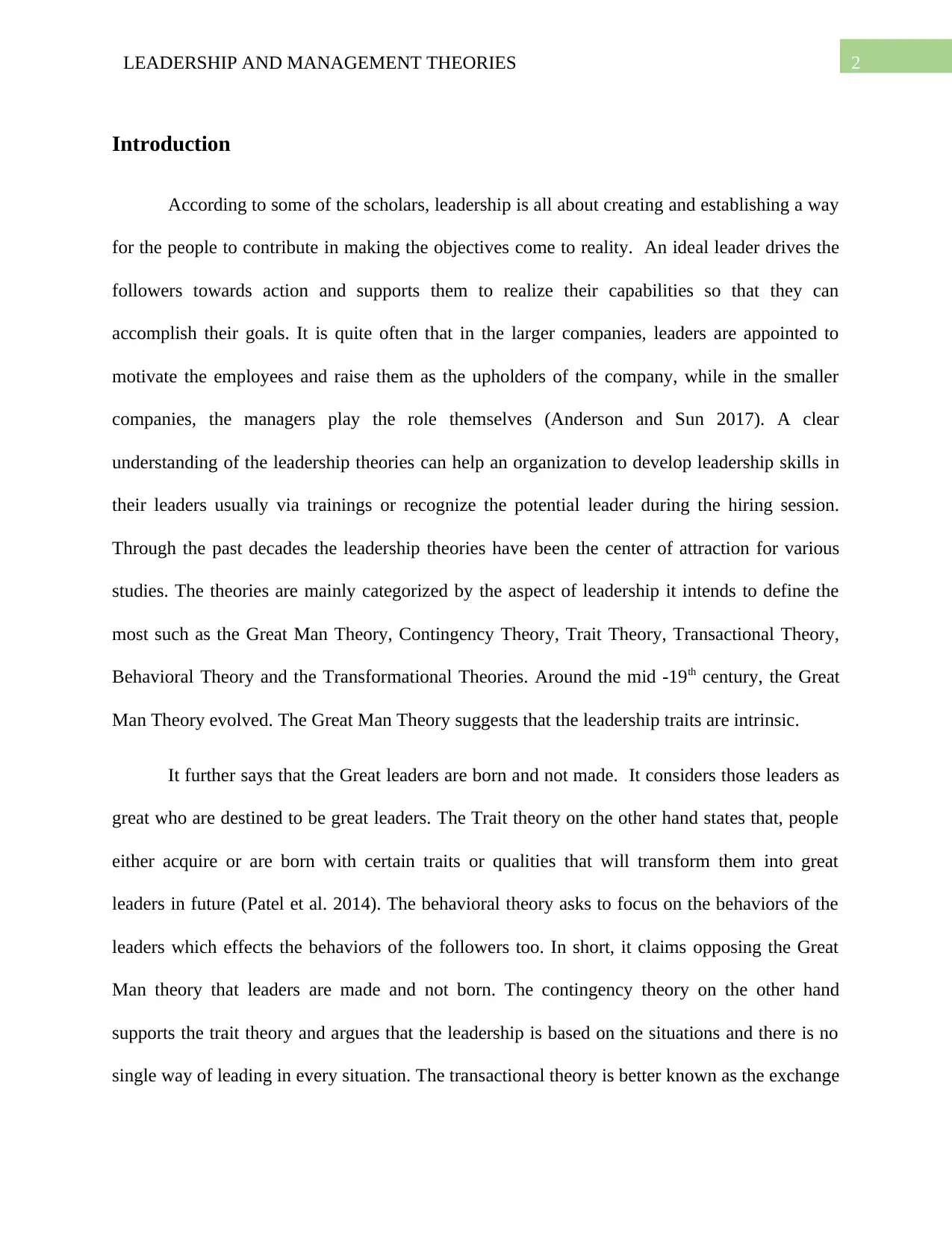
2LEADERSHIP AND MANAGEMENT THEORIES
Introduction
According to some of the scholars, leadership is all about creating and establishing a way
for the people to contribute in making the objectives come to reality. An ideal leader drives the
followers towards action and supports them to realize their capabilities so that they can
accomplish their goals. It is quite often that in the larger companies, leaders are appointed to
motivate the employees and raise them as the upholders of the company, while in the smaller
companies, the managers play the role themselves (Anderson and Sun 2017). A clear
understanding of the leadership theories can help an organization to develop leadership skills in
their leaders usually via trainings or recognize the potential leader during the hiring session.
Through the past decades the leadership theories have been the center of attraction for various
studies. The theories are mainly categorized by the aspect of leadership it intends to define the
most such as the Great Man Theory, Contingency Theory, Trait Theory, Transactional Theory,
Behavioral Theory and the Transformational Theories. Around the mid -19th century, the Great
Man Theory evolved. The Great Man Theory suggests that the leadership traits are intrinsic.
It further says that the Great leaders are born and not made. It considers those leaders as
great who are destined to be great leaders. The Trait theory on the other hand states that, people
either acquire or are born with certain traits or qualities that will transform them into great
leaders in future (Patel et al. 2014). The behavioral theory asks to focus on the behaviors of the
leaders which effects the behaviors of the followers too. In short, it claims opposing the Great
Man theory that leaders are made and not born. The contingency theory on the other hand
supports the trait theory and argues that the leadership is based on the situations and there is no
single way of leading in every situation. The transactional theory is better known as the exchange
Introduction
According to some of the scholars, leadership is all about creating and establishing a way
for the people to contribute in making the objectives come to reality. An ideal leader drives the
followers towards action and supports them to realize their capabilities so that they can
accomplish their goals. It is quite often that in the larger companies, leaders are appointed to
motivate the employees and raise them as the upholders of the company, while in the smaller
companies, the managers play the role themselves (Anderson and Sun 2017). A clear
understanding of the leadership theories can help an organization to develop leadership skills in
their leaders usually via trainings or recognize the potential leader during the hiring session.
Through the past decades the leadership theories have been the center of attraction for various
studies. The theories are mainly categorized by the aspect of leadership it intends to define the
most such as the Great Man Theory, Contingency Theory, Trait Theory, Transactional Theory,
Behavioral Theory and the Transformational Theories. Around the mid -19th century, the Great
Man Theory evolved. The Great Man Theory suggests that the leadership traits are intrinsic.
It further says that the Great leaders are born and not made. It considers those leaders as
great who are destined to be great leaders. The Trait theory on the other hand states that, people
either acquire or are born with certain traits or qualities that will transform them into great
leaders in future (Patel et al. 2014). The behavioral theory asks to focus on the behaviors of the
leaders which effects the behaviors of the followers too. In short, it claims opposing the Great
Man theory that leaders are made and not born. The contingency theory on the other hand
supports the trait theory and argues that the leadership is based on the situations and there is no
single way of leading in every situation. The transactional theory is better known as the exchange
⊘ This is a preview!⊘
Do you want full access?
Subscribe today to unlock all pages.

Trusted by 1+ million students worldwide
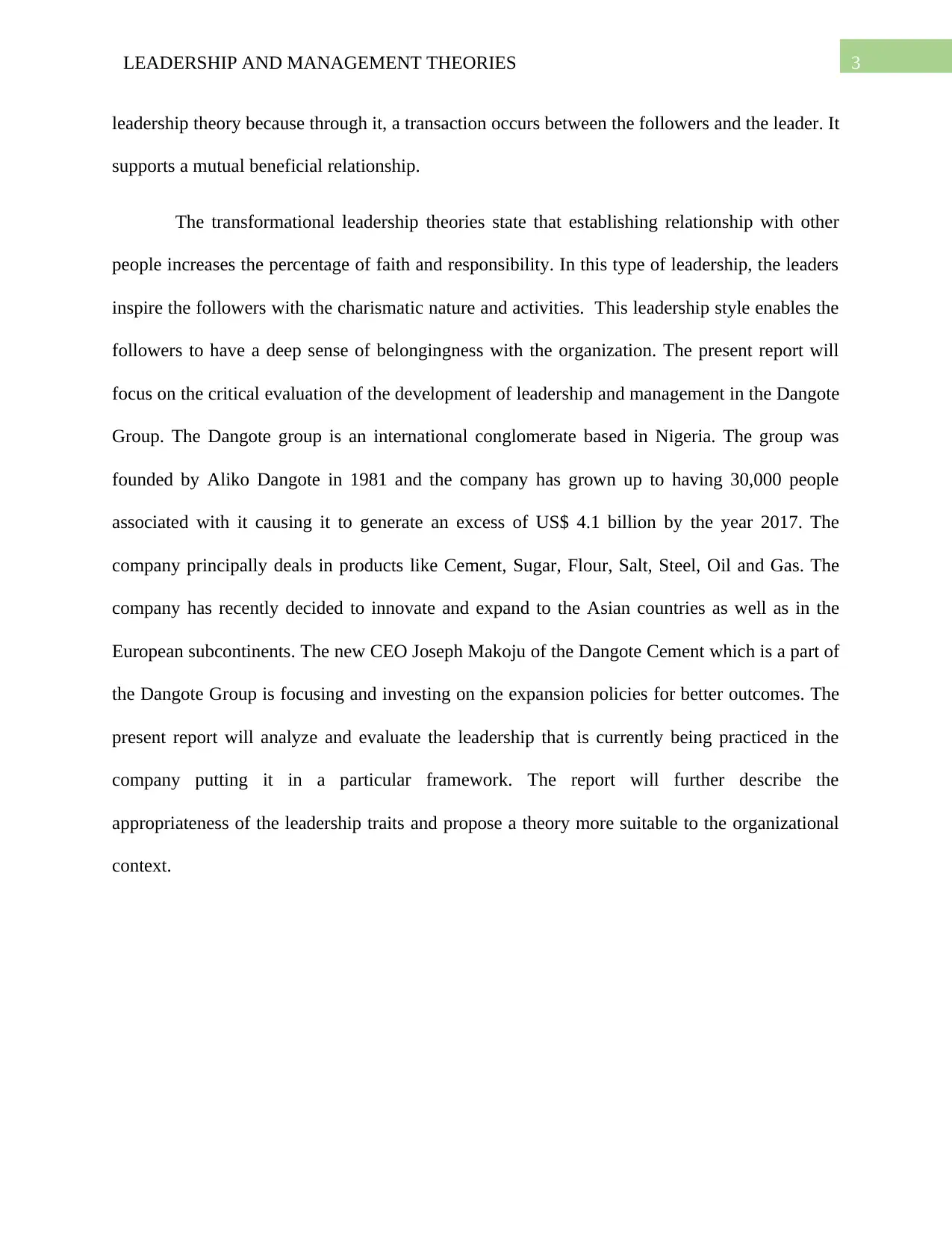
3LEADERSHIP AND MANAGEMENT THEORIES
leadership theory because through it, a transaction occurs between the followers and the leader. It
supports a mutual beneficial relationship.
The transformational leadership theories state that establishing relationship with other
people increases the percentage of faith and responsibility. In this type of leadership, the leaders
inspire the followers with the charismatic nature and activities. This leadership style enables the
followers to have a deep sense of belongingness with the organization. The present report will
focus on the critical evaluation of the development of leadership and management in the Dangote
Group. The Dangote group is an international conglomerate based in Nigeria. The group was
founded by Aliko Dangote in 1981 and the company has grown up to having 30,000 people
associated with it causing it to generate an excess of US$ 4.1 billion by the year 2017. The
company principally deals in products like Cement, Sugar, Flour, Salt, Steel, Oil and Gas. The
company has recently decided to innovate and expand to the Asian countries as well as in the
European subcontinents. The new CEO Joseph Makoju of the Dangote Cement which is a part of
the Dangote Group is focusing and investing on the expansion policies for better outcomes. The
present report will analyze and evaluate the leadership that is currently being practiced in the
company putting it in a particular framework. The report will further describe the
appropriateness of the leadership traits and propose a theory more suitable to the organizational
context.
leadership theory because through it, a transaction occurs between the followers and the leader. It
supports a mutual beneficial relationship.
The transformational leadership theories state that establishing relationship with other
people increases the percentage of faith and responsibility. In this type of leadership, the leaders
inspire the followers with the charismatic nature and activities. This leadership style enables the
followers to have a deep sense of belongingness with the organization. The present report will
focus on the critical evaluation of the development of leadership and management in the Dangote
Group. The Dangote group is an international conglomerate based in Nigeria. The group was
founded by Aliko Dangote in 1981 and the company has grown up to having 30,000 people
associated with it causing it to generate an excess of US$ 4.1 billion by the year 2017. The
company principally deals in products like Cement, Sugar, Flour, Salt, Steel, Oil and Gas. The
company has recently decided to innovate and expand to the Asian countries as well as in the
European subcontinents. The new CEO Joseph Makoju of the Dangote Cement which is a part of
the Dangote Group is focusing and investing on the expansion policies for better outcomes. The
present report will analyze and evaluate the leadership that is currently being practiced in the
company putting it in a particular framework. The report will further describe the
appropriateness of the leadership traits and propose a theory more suitable to the organizational
context.
Paraphrase This Document
Need a fresh take? Get an instant paraphrase of this document with our AI Paraphraser
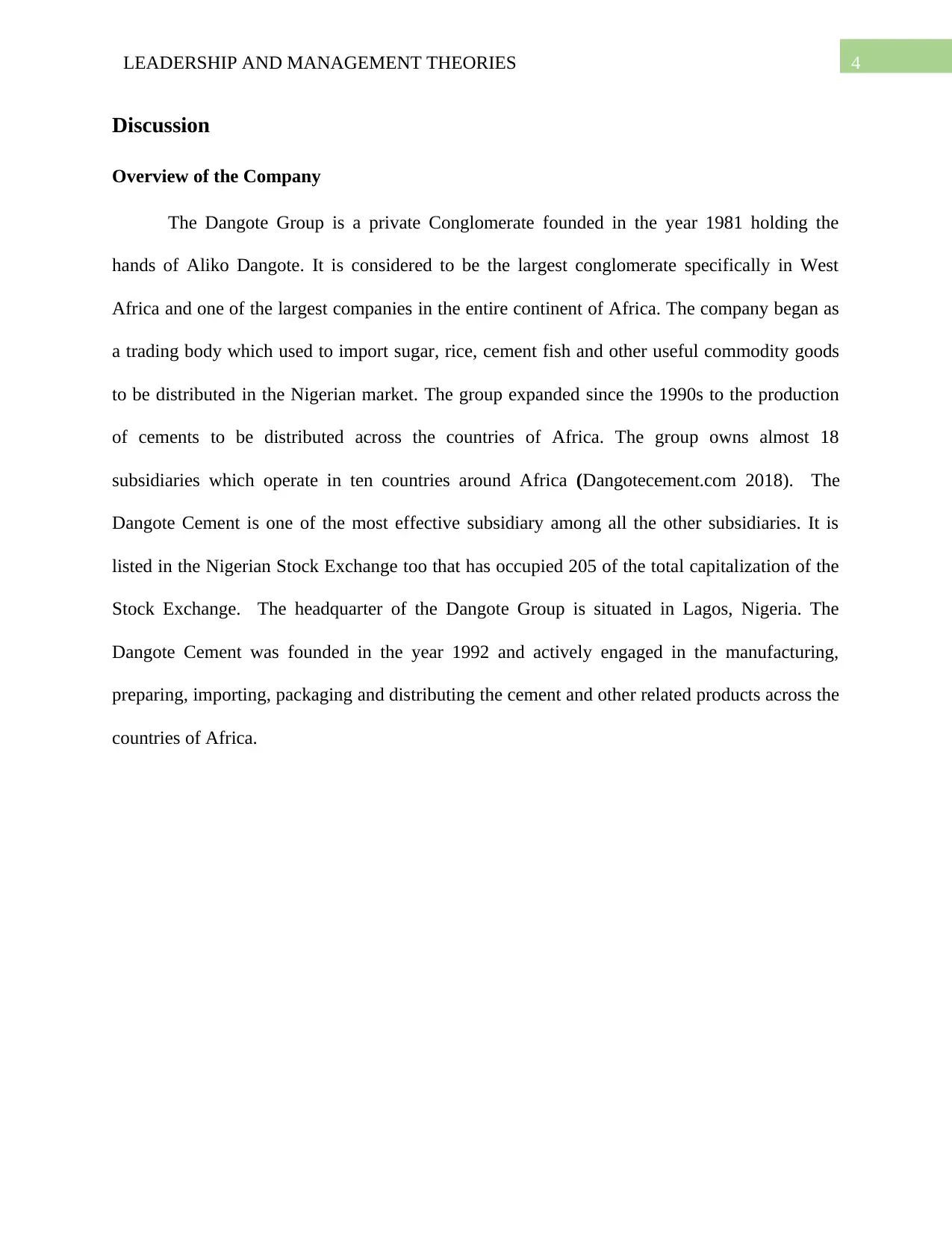
4LEADERSHIP AND MANAGEMENT THEORIES
Discussion
Overview of the Company
The Dangote Group is a private Conglomerate founded in the year 1981 holding the
hands of Aliko Dangote. It is considered to be the largest conglomerate specifically in West
Africa and one of the largest companies in the entire continent of Africa. The company began as
a trading body which used to import sugar, rice, cement fish and other useful commodity goods
to be distributed in the Nigerian market. The group expanded since the 1990s to the production
of cements to be distributed across the countries of Africa. The group owns almost 18
subsidiaries which operate in ten countries around Africa (Dangotecement.com 2018). The
Dangote Cement is one of the most effective subsidiary among all the other subsidiaries. It is
listed in the Nigerian Stock Exchange too that has occupied 205 of the total capitalization of the
Stock Exchange. The headquarter of the Dangote Group is situated in Lagos, Nigeria. The
Dangote Cement was founded in the year 1992 and actively engaged in the manufacturing,
preparing, importing, packaging and distributing the cement and other related products across the
countries of Africa.
Discussion
Overview of the Company
The Dangote Group is a private Conglomerate founded in the year 1981 holding the
hands of Aliko Dangote. It is considered to be the largest conglomerate specifically in West
Africa and one of the largest companies in the entire continent of Africa. The company began as
a trading body which used to import sugar, rice, cement fish and other useful commodity goods
to be distributed in the Nigerian market. The group expanded since the 1990s to the production
of cements to be distributed across the countries of Africa. The group owns almost 18
subsidiaries which operate in ten countries around Africa (Dangotecement.com 2018). The
Dangote Cement is one of the most effective subsidiary among all the other subsidiaries. It is
listed in the Nigerian Stock Exchange too that has occupied 205 of the total capitalization of the
Stock Exchange. The headquarter of the Dangote Group is situated in Lagos, Nigeria. The
Dangote Cement was founded in the year 1992 and actively engaged in the manufacturing,
preparing, importing, packaging and distributing the cement and other related products across the
countries of Africa.
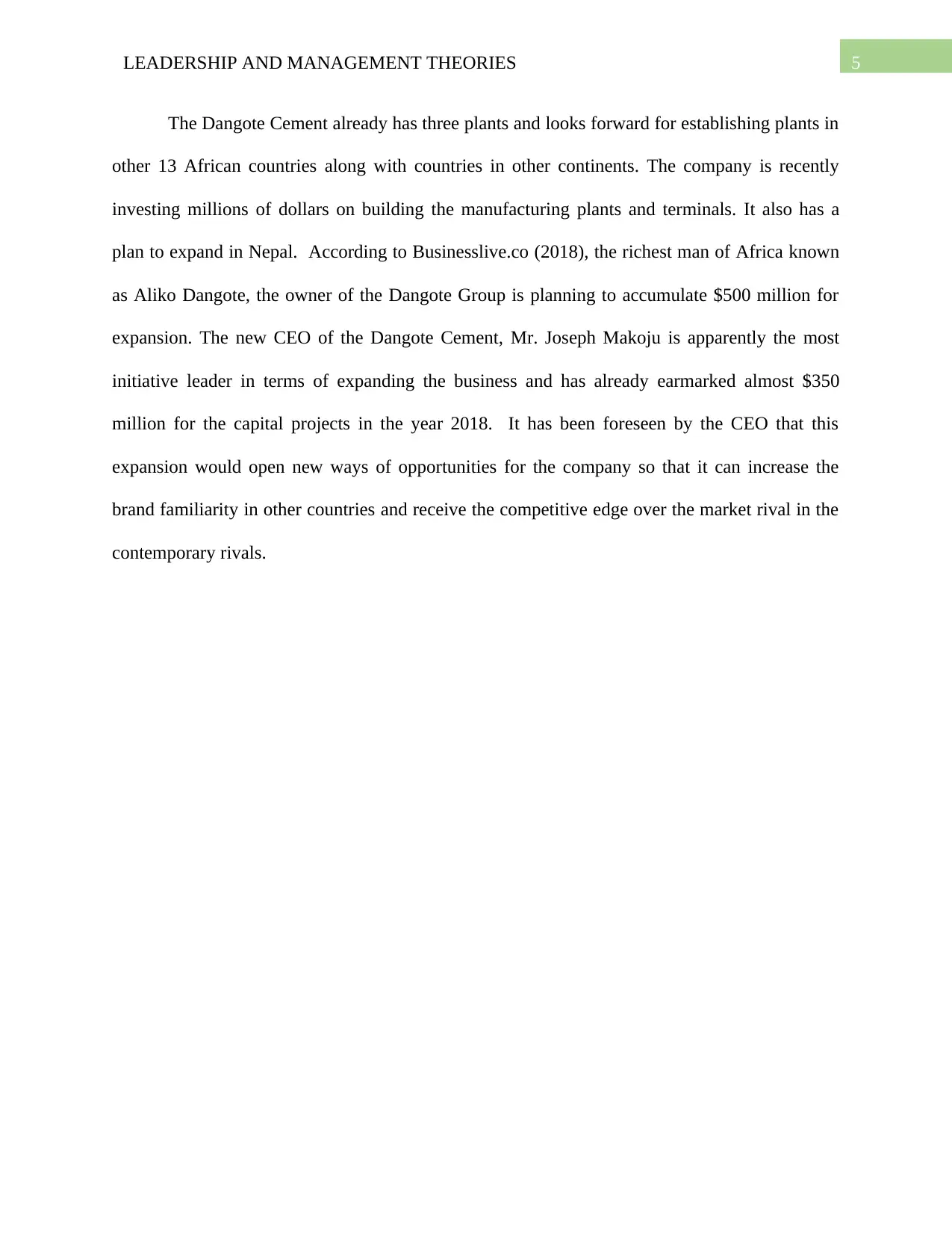
5LEADERSHIP AND MANAGEMENT THEORIES
The Dangote Cement already has three plants and looks forward for establishing plants in
other 13 African countries along with countries in other continents. The company is recently
investing millions of dollars on building the manufacturing plants and terminals. It also has a
plan to expand in Nepal. According to Businesslive.co (2018), the richest man of Africa known
as Aliko Dangote, the owner of the Dangote Group is planning to accumulate $500 million for
expansion. The new CEO of the Dangote Cement, Mr. Joseph Makoju is apparently the most
initiative leader in terms of expanding the business and has already earmarked almost $350
million for the capital projects in the year 2018. It has been foreseen by the CEO that this
expansion would open new ways of opportunities for the company so that it can increase the
brand familiarity in other countries and receive the competitive edge over the market rival in the
contemporary rivals.
The Dangote Cement already has three plants and looks forward for establishing plants in
other 13 African countries along with countries in other continents. The company is recently
investing millions of dollars on building the manufacturing plants and terminals. It also has a
plan to expand in Nepal. According to Businesslive.co (2018), the richest man of Africa known
as Aliko Dangote, the owner of the Dangote Group is planning to accumulate $500 million for
expansion. The new CEO of the Dangote Cement, Mr. Joseph Makoju is apparently the most
initiative leader in terms of expanding the business and has already earmarked almost $350
million for the capital projects in the year 2018. It has been foreseen by the CEO that this
expansion would open new ways of opportunities for the company so that it can increase the
brand familiarity in other countries and receive the competitive edge over the market rival in the
contemporary rivals.
⊘ This is a preview!⊘
Do you want full access?
Subscribe today to unlock all pages.

Trusted by 1+ million students worldwide
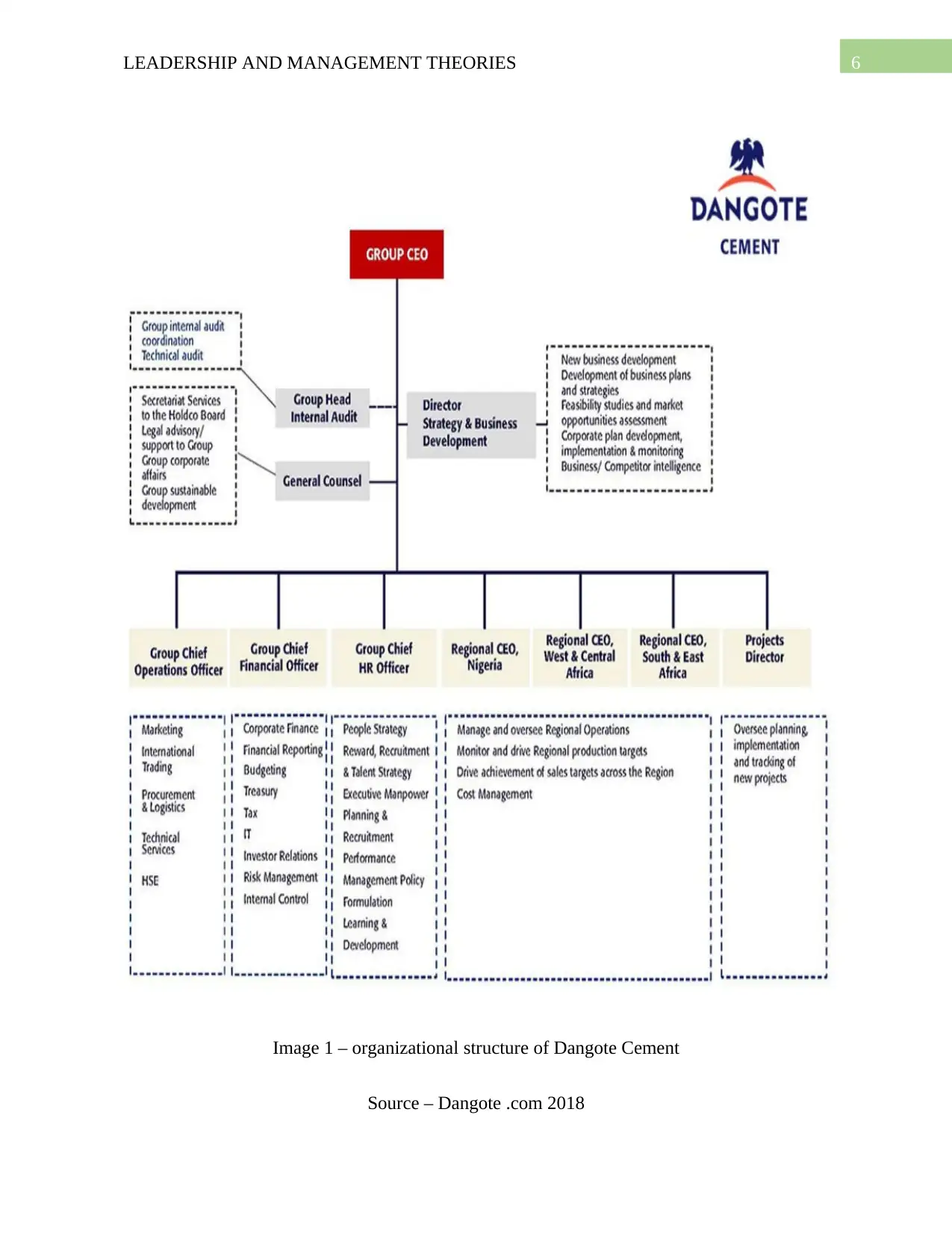
6LEADERSHIP AND MANAGEMENT THEORIES
Image 1 – organizational structure of Dangote Cement
Source – Dangote .com 2018
Image 1 – organizational structure of Dangote Cement
Source – Dangote .com 2018
Paraphrase This Document
Need a fresh take? Get an instant paraphrase of this document with our AI Paraphraser
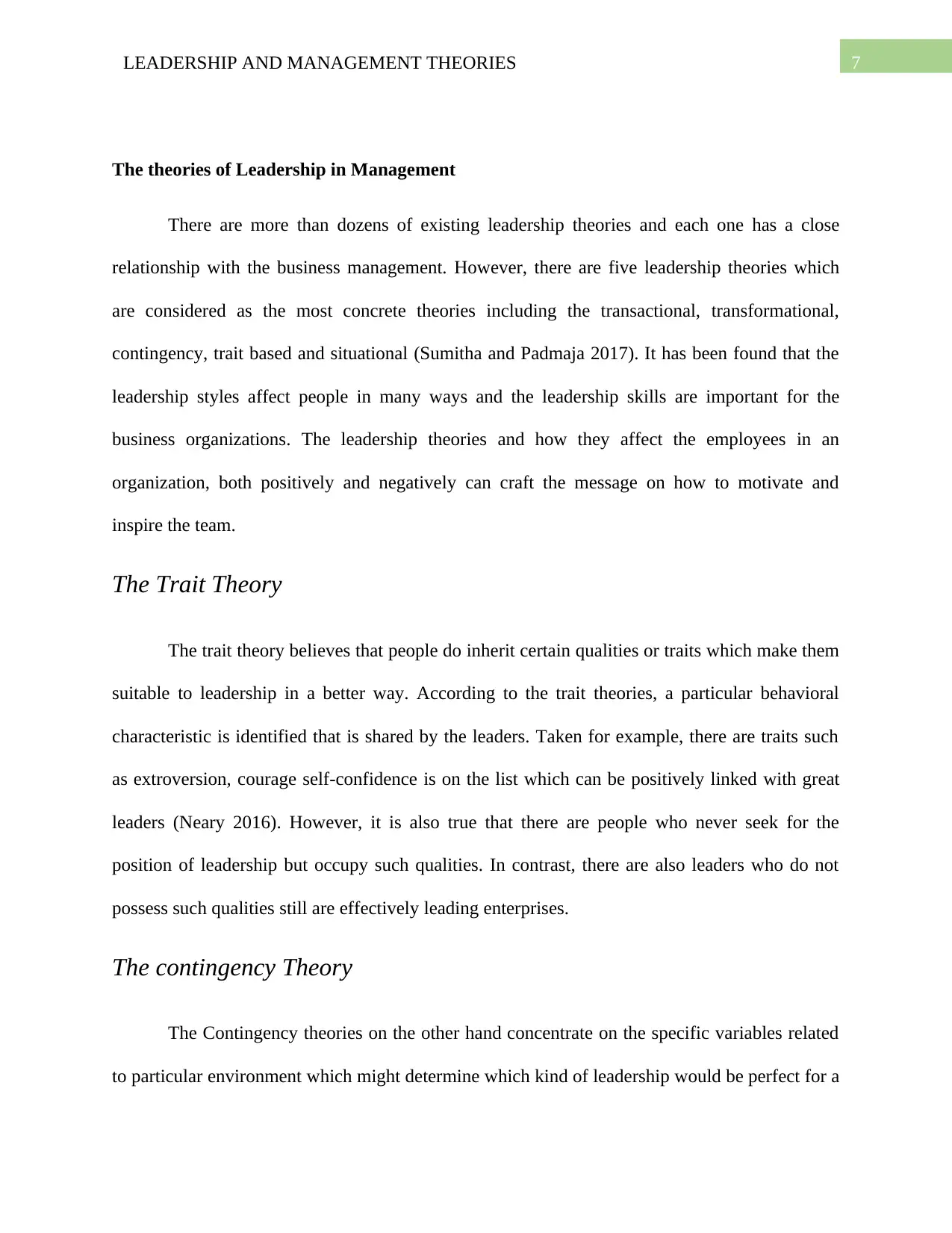
7LEADERSHIP AND MANAGEMENT THEORIES
The theories of Leadership in Management
There are more than dozens of existing leadership theories and each one has a close
relationship with the business management. However, there are five leadership theories which
are considered as the most concrete theories including the transactional, transformational,
contingency, trait based and situational (Sumitha and Padmaja 2017). It has been found that the
leadership styles affect people in many ways and the leadership skills are important for the
business organizations. The leadership theories and how they affect the employees in an
organization, both positively and negatively can craft the message on how to motivate and
inspire the team.
The Trait Theory
The trait theory believes that people do inherit certain qualities or traits which make them
suitable to leadership in a better way. According to the trait theories, a particular behavioral
characteristic is identified that is shared by the leaders. Taken for example, there are traits such
as extroversion, courage self-confidence is on the list which can be positively linked with great
leaders (Neary 2016). However, it is also true that there are people who never seek for the
position of leadership but occupy such qualities. In contrast, there are also leaders who do not
possess such qualities still are effectively leading enterprises.
The contingency Theory
The Contingency theories on the other hand concentrate on the specific variables related
to particular environment which might determine which kind of leadership would be perfect for a
The theories of Leadership in Management
There are more than dozens of existing leadership theories and each one has a close
relationship with the business management. However, there are five leadership theories which
are considered as the most concrete theories including the transactional, transformational,
contingency, trait based and situational (Sumitha and Padmaja 2017). It has been found that the
leadership styles affect people in many ways and the leadership skills are important for the
business organizations. The leadership theories and how they affect the employees in an
organization, both positively and negatively can craft the message on how to motivate and
inspire the team.
The Trait Theory
The trait theory believes that people do inherit certain qualities or traits which make them
suitable to leadership in a better way. According to the trait theories, a particular behavioral
characteristic is identified that is shared by the leaders. Taken for example, there are traits such
as extroversion, courage self-confidence is on the list which can be positively linked with great
leaders (Neary 2016). However, it is also true that there are people who never seek for the
position of leadership but occupy such qualities. In contrast, there are also leaders who do not
possess such qualities still are effectively leading enterprises.
The contingency Theory
The Contingency theories on the other hand concentrate on the specific variables related
to particular environment which might determine which kind of leadership would be perfect for a
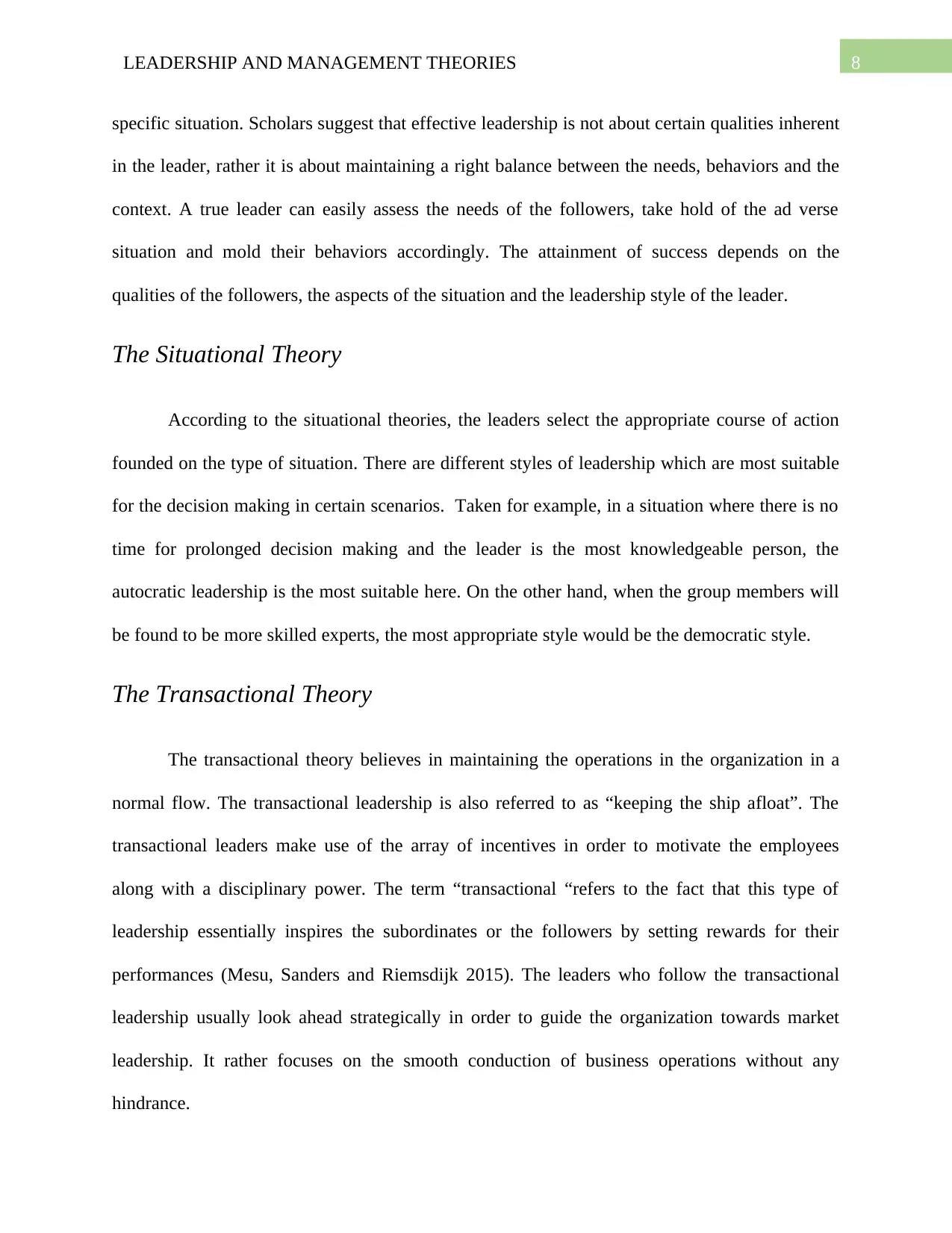
8LEADERSHIP AND MANAGEMENT THEORIES
specific situation. Scholars suggest that effective leadership is not about certain qualities inherent
in the leader, rather it is about maintaining a right balance between the needs, behaviors and the
context. A true leader can easily assess the needs of the followers, take hold of the ad verse
situation and mold their behaviors accordingly. The attainment of success depends on the
qualities of the followers, the aspects of the situation and the leadership style of the leader.
The Situational Theory
According to the situational theories, the leaders select the appropriate course of action
founded on the type of situation. There are different styles of leadership which are most suitable
for the decision making in certain scenarios. Taken for example, in a situation where there is no
time for prolonged decision making and the leader is the most knowledgeable person, the
autocratic leadership is the most suitable here. On the other hand, when the group members will
be found to be more skilled experts, the most appropriate style would be the democratic style.
The Transactional Theory
The transactional theory believes in maintaining the operations in the organization in a
normal flow. The transactional leadership is also referred to as “keeping the ship afloat”. The
transactional leaders make use of the array of incentives in order to motivate the employees
along with a disciplinary power. The term “transactional “refers to the fact that this type of
leadership essentially inspires the subordinates or the followers by setting rewards for their
performances (Mesu, Sanders and Riemsdijk 2015). The leaders who follow the transactional
leadership usually look ahead strategically in order to guide the organization towards market
leadership. It rather focuses on the smooth conduction of business operations without any
hindrance.
specific situation. Scholars suggest that effective leadership is not about certain qualities inherent
in the leader, rather it is about maintaining a right balance between the needs, behaviors and the
context. A true leader can easily assess the needs of the followers, take hold of the ad verse
situation and mold their behaviors accordingly. The attainment of success depends on the
qualities of the followers, the aspects of the situation and the leadership style of the leader.
The Situational Theory
According to the situational theories, the leaders select the appropriate course of action
founded on the type of situation. There are different styles of leadership which are most suitable
for the decision making in certain scenarios. Taken for example, in a situation where there is no
time for prolonged decision making and the leader is the most knowledgeable person, the
autocratic leadership is the most suitable here. On the other hand, when the group members will
be found to be more skilled experts, the most appropriate style would be the democratic style.
The Transactional Theory
The transactional theory believes in maintaining the operations in the organization in a
normal flow. The transactional leadership is also referred to as “keeping the ship afloat”. The
transactional leaders make use of the array of incentives in order to motivate the employees
along with a disciplinary power. The term “transactional “refers to the fact that this type of
leadership essentially inspires the subordinates or the followers by setting rewards for their
performances (Mesu, Sanders and Riemsdijk 2015). The leaders who follow the transactional
leadership usually look ahead strategically in order to guide the organization towards market
leadership. It rather focuses on the smooth conduction of business operations without any
hindrance.
⊘ This is a preview!⊘
Do you want full access?
Subscribe today to unlock all pages.

Trusted by 1+ million students worldwide
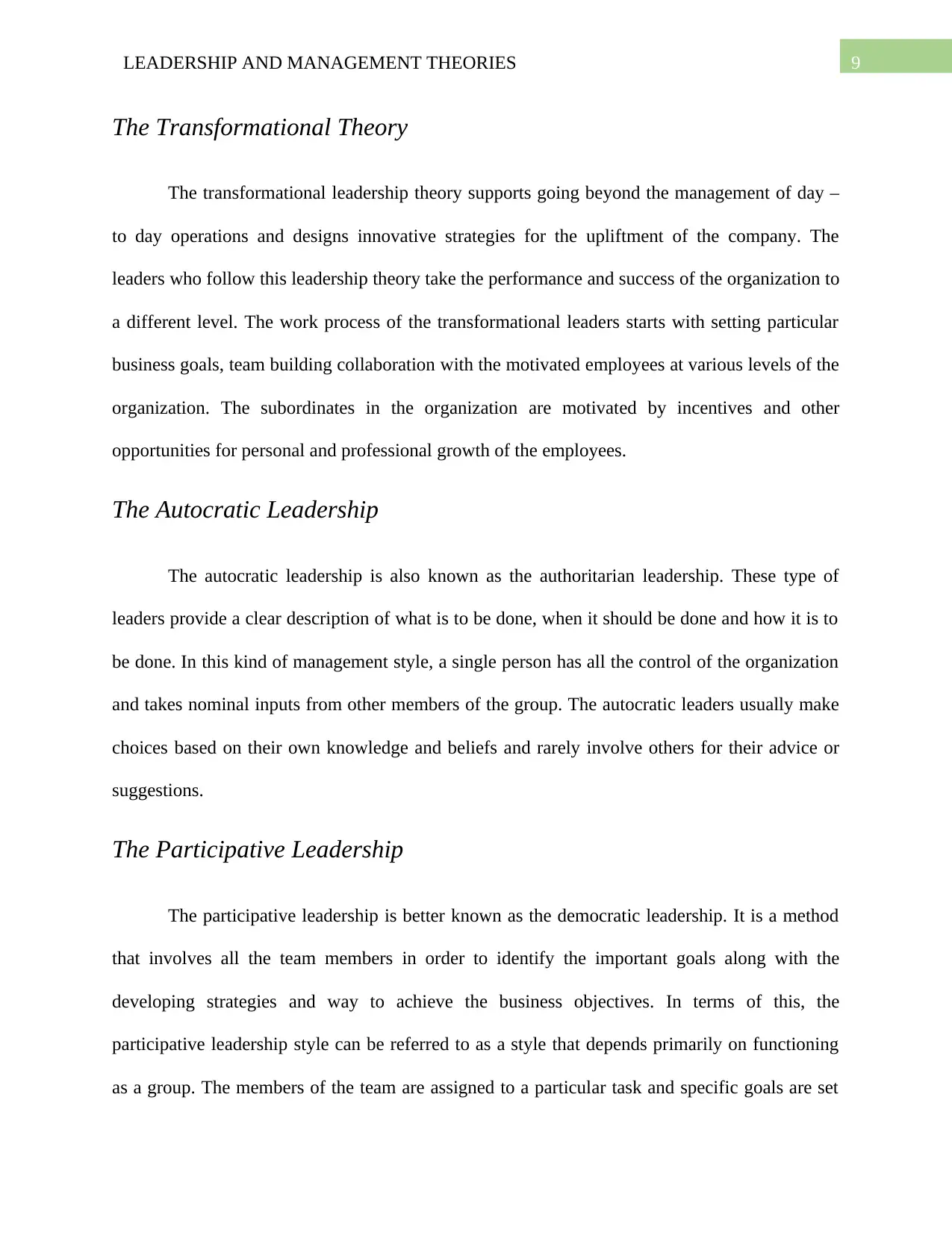
9LEADERSHIP AND MANAGEMENT THEORIES
The Transformational Theory
The transformational leadership theory supports going beyond the management of day –
to day operations and designs innovative strategies for the upliftment of the company. The
leaders who follow this leadership theory take the performance and success of the organization to
a different level. The work process of the transformational leaders starts with setting particular
business goals, team building collaboration with the motivated employees at various levels of the
organization. The subordinates in the organization are motivated by incentives and other
opportunities for personal and professional growth of the employees.
The Autocratic Leadership
The autocratic leadership is also known as the authoritarian leadership. These type of
leaders provide a clear description of what is to be done, when it should be done and how it is to
be done. In this kind of management style, a single person has all the control of the organization
and takes nominal inputs from other members of the group. The autocratic leaders usually make
choices based on their own knowledge and beliefs and rarely involve others for their advice or
suggestions.
The Participative Leadership
The participative leadership is better known as the democratic leadership. It is a method
that involves all the team members in order to identify the important goals along with the
developing strategies and way to achieve the business objectives. In terms of this, the
participative leadership style can be referred to as a style that depends primarily on functioning
as a group. The members of the team are assigned to a particular task and specific goals are set
The Transformational Theory
The transformational leadership theory supports going beyond the management of day –
to day operations and designs innovative strategies for the upliftment of the company. The
leaders who follow this leadership theory take the performance and success of the organization to
a different level. The work process of the transformational leaders starts with setting particular
business goals, team building collaboration with the motivated employees at various levels of the
organization. The subordinates in the organization are motivated by incentives and other
opportunities for personal and professional growth of the employees.
The Autocratic Leadership
The autocratic leadership is also known as the authoritarian leadership. These type of
leaders provide a clear description of what is to be done, when it should be done and how it is to
be done. In this kind of management style, a single person has all the control of the organization
and takes nominal inputs from other members of the group. The autocratic leaders usually make
choices based on their own knowledge and beliefs and rarely involve others for their advice or
suggestions.
The Participative Leadership
The participative leadership is better known as the democratic leadership. It is a method
that involves all the team members in order to identify the important goals along with the
developing strategies and way to achieve the business objectives. In terms of this, the
participative leadership style can be referred to as a style that depends primarily on functioning
as a group. The members of the team are assigned to a particular task and specific goals are set
Paraphrase This Document
Need a fresh take? Get an instant paraphrase of this document with our AI Paraphraser
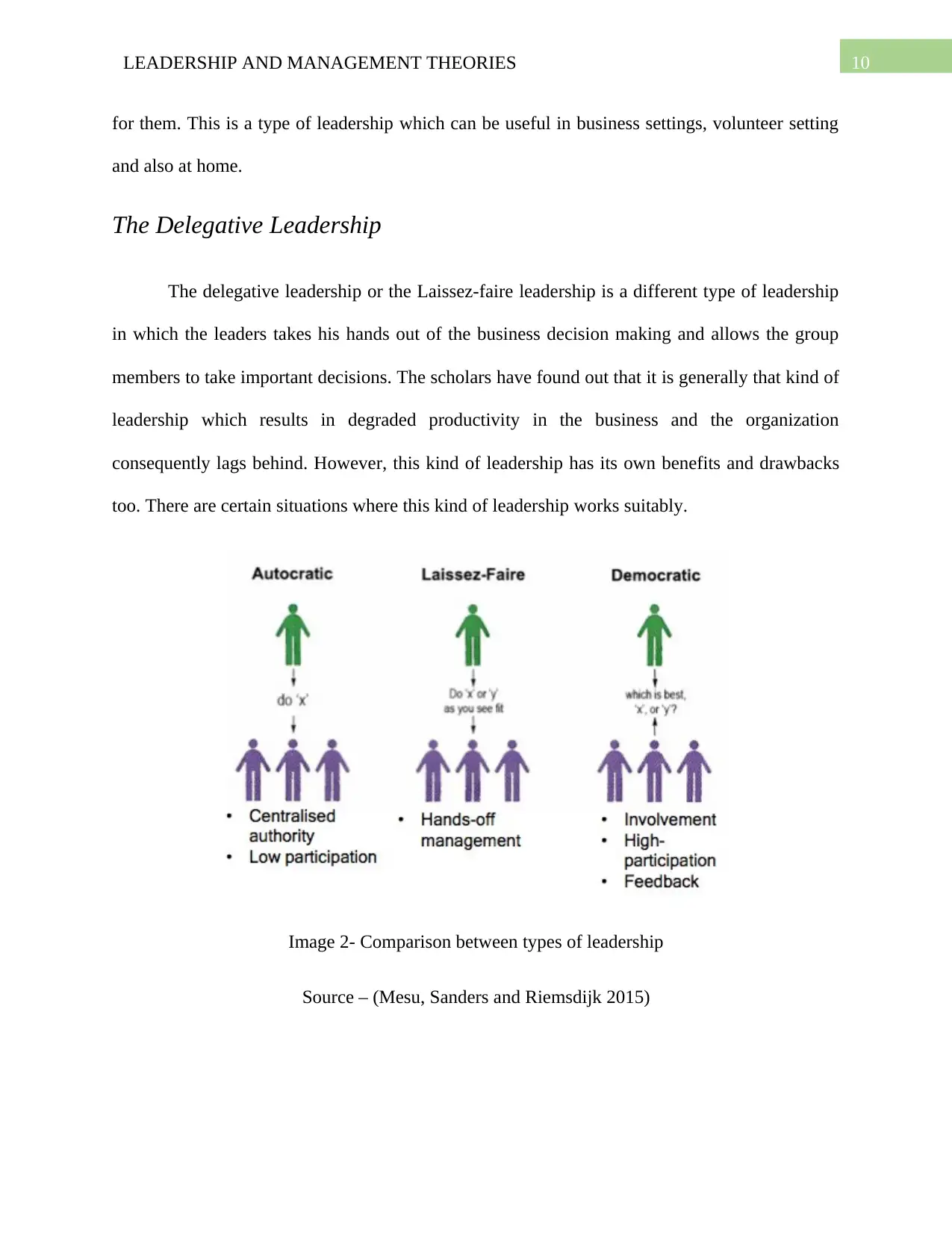
10LEADERSHIP AND MANAGEMENT THEORIES
for them. This is a type of leadership which can be useful in business settings, volunteer setting
and also at home.
The Delegative Leadership
The delegative leadership or the Laissez-faire leadership is a different type of leadership
in which the leaders takes his hands out of the business decision making and allows the group
members to take important decisions. The scholars have found out that it is generally that kind of
leadership which results in degraded productivity in the business and the organization
consequently lags behind. However, this kind of leadership has its own benefits and drawbacks
too. There are certain situations where this kind of leadership works suitably.
Image 2- Comparison between types of leadership
Source – (Mesu, Sanders and Riemsdijk 2015)
for them. This is a type of leadership which can be useful in business settings, volunteer setting
and also at home.
The Delegative Leadership
The delegative leadership or the Laissez-faire leadership is a different type of leadership
in which the leaders takes his hands out of the business decision making and allows the group
members to take important decisions. The scholars have found out that it is generally that kind of
leadership which results in degraded productivity in the business and the organization
consequently lags behind. However, this kind of leadership has its own benefits and drawbacks
too. There are certain situations where this kind of leadership works suitably.
Image 2- Comparison between types of leadership
Source – (Mesu, Sanders and Riemsdijk 2015)
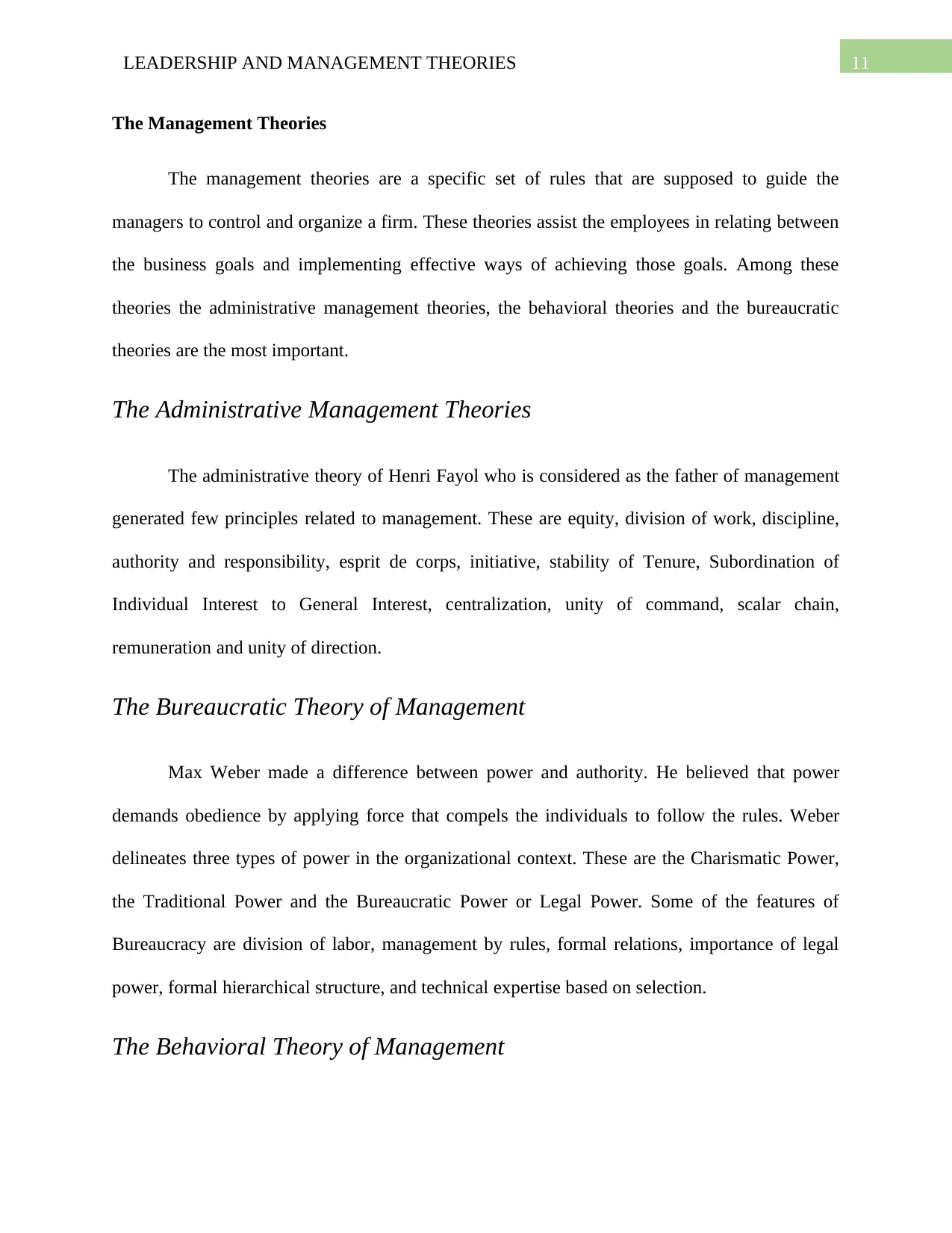
11LEADERSHIP AND MANAGEMENT THEORIES
The Management Theories
The management theories are a specific set of rules that are supposed to guide the
managers to control and organize a firm. These theories assist the employees in relating between
the business goals and implementing effective ways of achieving those goals. Among these
theories the administrative management theories, the behavioral theories and the bureaucratic
theories are the most important.
The Administrative Management Theories
The administrative theory of Henri Fayol who is considered as the father of management
generated few principles related to management. These are equity, division of work, discipline,
authority and responsibility, esprit de corps, initiative, stability of Tenure, Subordination of
Individual Interest to General Interest, centralization, unity of command, scalar chain,
remuneration and unity of direction.
The Bureaucratic Theory of Management
Max Weber made a difference between power and authority. He believed that power
demands obedience by applying force that compels the individuals to follow the rules. Weber
delineates three types of power in the organizational context. These are the Charismatic Power,
the Traditional Power and the Bureaucratic Power or Legal Power. Some of the features of
Bureaucracy are division of labor, management by rules, formal relations, importance of legal
power, formal hierarchical structure, and technical expertise based on selection.
The Behavioral Theory of Management
The Management Theories
The management theories are a specific set of rules that are supposed to guide the
managers to control and organize a firm. These theories assist the employees in relating between
the business goals and implementing effective ways of achieving those goals. Among these
theories the administrative management theories, the behavioral theories and the bureaucratic
theories are the most important.
The Administrative Management Theories
The administrative theory of Henri Fayol who is considered as the father of management
generated few principles related to management. These are equity, division of work, discipline,
authority and responsibility, esprit de corps, initiative, stability of Tenure, Subordination of
Individual Interest to General Interest, centralization, unity of command, scalar chain,
remuneration and unity of direction.
The Bureaucratic Theory of Management
Max Weber made a difference between power and authority. He believed that power
demands obedience by applying force that compels the individuals to follow the rules. Weber
delineates three types of power in the organizational context. These are the Charismatic Power,
the Traditional Power and the Bureaucratic Power or Legal Power. Some of the features of
Bureaucracy are division of labor, management by rules, formal relations, importance of legal
power, formal hierarchical structure, and technical expertise based on selection.
The Behavioral Theory of Management
⊘ This is a preview!⊘
Do you want full access?
Subscribe today to unlock all pages.

Trusted by 1+ million students worldwide
1 out of 28
Related Documents
Your All-in-One AI-Powered Toolkit for Academic Success.
+13062052269
info@desklib.com
Available 24*7 on WhatsApp / Email
![[object Object]](/_next/static/media/star-bottom.7253800d.svg)
Unlock your academic potential
Copyright © 2020–2026 A2Z Services. All Rights Reserved. Developed and managed by ZUCOL.





